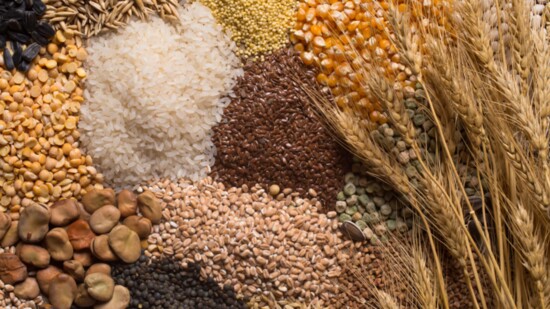In 2018, a group of 13 individuals, from grain farmers and millers to bakers and more, came together to address the underrepresentation of local grain in Virginia and the mid-Atlantic. With an eye on growing the local grain economy, they formed the Common Grain Alliance (CGA), a non-profit organization with a mission of supporting and connecting local individuals and businesses that are part of the grain industry while also raising consumer awareness and accessibility to local grains.
“The inspiration was to grow the regional grain economy to grow the local grains to provide a network and a resource for members to share information with one another to bring back that knowledge that we used to have about growing grain in our region,” said Madelyn Smith, Executive Director of CGA. “It’s common to go to farmers market and see local vegetables, fruit, beef, and dairy, but it’s rare to see a bag of flour, rice, or beans at your local farmers market.”
The organization has expanded since its inception six years ago to 128 members throughout the mid-Atlantic, from as far north as Pennsylvania to as far south as North Carolina. One member who has been at the forefront of that growth is Jeff Bloem, owner of Murphy & Rude Malting Co. in Charlottesville. Bloem joined CGA just a year after it was started and is now on the Board of Directors and has taken on the role of Treasurer.
“I got involved with CGA in its infancy,” Bloem said. “I originally found CGA because I was looking for a better [way] to network with farmers.”
While Bloem is enthusiastic about the opportunity that CGA offers for members to network, which ultimately allows members’ businesses to flourish, he’s equally passionate about what that growth means for consumers in the community. Bloem points to the fact that local makers are able to consistently craft grain-based products that are superior to those made by larger producers that may dominate the grocery store shelves.
“It’s a disconnected system between the farmer growing it and us eating it -- it’s been completely devalued and stripped of its identity and value,” Bloem said in reference to mass-produced grain products.
Instead, Bloem recommends that buyers look to local producers for their grains and prepared products, noting that their flavor is better and that the goods retain their nutrients, unlike those made by larger corporations.
“Patronize the places that are members of CGA, or are like-minded producers, like Althea Bread, Albemarle Baking Company, Cou Cou Rachou… Little Hat Creek, Great Harvest. And Smyrna. They buy their flour [for their bread] from Deep Roots Milling -- that’s why it tastes so good,” Bloem said. “These are really purposeful places -- you’re buying from people who are paying attention.”
Bloem also says that it is possible that people with non-Celiac gluten sensitivity may find that they can enjoy bread and other products that are made using local grains that undergo minimal processing. He cites the fact that commodity-produced breads are made from grains that are processed in ways that result in a lack of nutrients in the end product.
“Go to a local bakery using all local products. It’s a powerful thing if you realize that it’s not necessarily the type of food you're eating -- it’s what it’s made with,” he said. “Consciously grown, consciously processed ingredients -- it speaks for itself.”
At CGA’s core is the goal of shining the light on local producers and helping businesses to network but education is a priority, too. The organization hosts multiple events throughout the year that help to fulfill all of those goals from Baker Meetups for both professional and home bakers to a family-friendly grain fair, webinars, and more.
Additionally, through a partnership with the non-profit FRESHFARM, CGA has created an opportunity for mid-Atlantic producers to feature their grains at Washington, DC farmer’s markets. In Charlottesville, Bloem points to the many farmer's markets in the area at locations like IX Art Park and Pen Park, among others, as an ideal place for buyers to find consciously processed and locally grown grains as well as products that are made with them.
“The greatest compliment to a producer like this is appreciation for what they’re doing like buying their products and patronizing their bakery,” Bloem said. “It’s the greatest form of flattery…to appreciate we exist. That keeps us going.”
To learn more about Common Grain Alliance, find events or producers in the area, or donate, visit their website at commongrainalliance.org.
The greatest compliment to a producer is appreciation for what they’re doing.
You’re buying from people who are paying attention.
